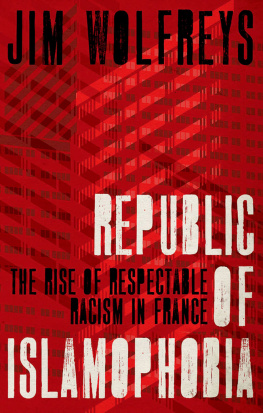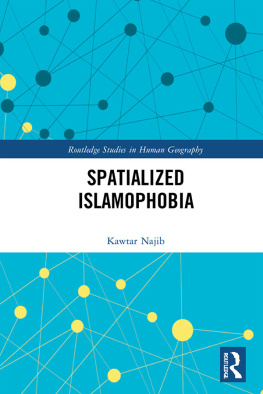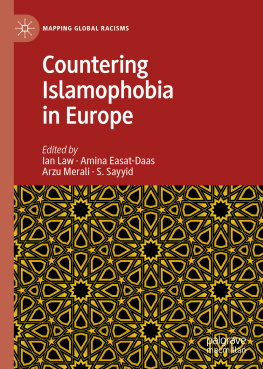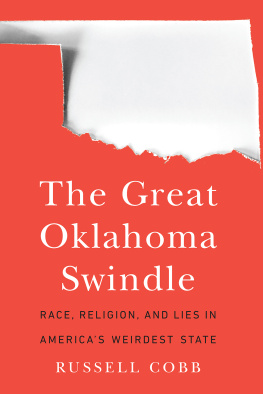Great Russell - Republic of Islamophobia
Here you can read online Great Russell - Republic of Islamophobia full text of the book (entire story) in english for free. Download pdf and epub, get meaning, cover and reviews about this ebook. year: 2018, publisher: Oxford University Press, genre: Politics. Description of the work, (preface) as well as reviews are available. Best literature library LitArk.com created for fans of good reading and offers a wide selection of genres:
Romance novel
Science fiction
Adventure
Detective
Science
History
Home and family
Prose
Art
Politics
Computer
Non-fiction
Religion
Business
Children
Humor
Choose a favorite category and find really read worthwhile books. Enjoy immersion in the world of imagination, feel the emotions of the characters or learn something new for yourself, make an fascinating discovery.
- Book:Republic of Islamophobia
- Author:
- Publisher:Oxford University Press
- Genre:
- Year:2018
- Rating:5 / 5
- Favourites:Add to favourites
- Your mark:
- 100
- 1
- 2
- 3
- 4
- 5
Republic of Islamophobia: summary, description and annotation
We offer to read an annotation, description, summary or preface (depends on what the author of the book "Republic of Islamophobia" wrote himself). If you haven't found the necessary information about the book — write in the comments, we will try to find it.
Republic of Islamophobia — read online for free the complete book (whole text) full work
Below is the text of the book, divided by pages. System saving the place of the last page read, allows you to conveniently read the book "Republic of Islamophobia" online for free, without having to search again every time where you left off. Put a bookmark, and you can go to the page where you finished reading at any time.
Font size:
Interval:
Bookmark:

The Rise of Respectable Racism in France


Oxford University Press is a department of the University of Oxford. It furthers the Universitys objective of excellence in research, scholarship, and education by publishing worldwide.
Oxford New York Auckland Cape Town Dar es Salaam Hong Kong Karachi Kuala Lumpur Madrid Melbourne Mexico City Nairobi New Delhi Shanghai Taipei Toronto
With offices in Argentina Austria Brazil Chile Czech Republic France Greece Guatemala Hungary Italy Japan Poland Portugal Singapore South Korea Switzerland Thailand Turkey Ukraine Vietnam
Oxford is a registered trade mark of Oxford University Press in the UK and certain other countries.
Published in the United States of America by
Oxford University Press
198 Madison Avenue, New York, NY 10016
Copyright Jim Wolfreys 2016
All rights reserved. No part of this publication may be reproduced, stored in a retrieval system, or transmitted, in any form or by any means, without the prior permission in writing of Oxford University Press, or as expressly permitted by law, by license, or under terms agreed with the appropriate reproduction rights organization. Inquiries concerningreproduction outside the scope of the above should be sent to the Rights Department, Oxford University Press, at the address above.
You must not circulate this work in any other form and you must impose this same condition on any acquirer.
This book is printed using paper from registered sustainable and managed sources.
Library of Congress Cataloging-in-Publication Data is availableJim Wolfreys
Hidden Power: The Strategic Logic of Organized Crime.
ISBN: 9780190911645
I am very grateful to the editorial team at Hurst for inviting me to write this book and for their professionalism, patience and encouragement throughout the process. Particular thanks to Lara Weisweiller-Wu, who was a meticulous editor, and to Alison Alexanian, Alasdair Craig, Jon de Peyer and Daisy Leitch. My department at Kings College London gave me valuable research leave and a travel grant. Edouard Morena provided detailed help with the manuscript, as did Megan Trudell, whose influence was indelible. Houria Bouteldja, Yasser Louati, Fania Nol, Ndella Paye and Omar Slaouti were very generous with their time and their insights, as were Denis, Meriem, Vanina and especially Selma. Thanks also to Sebastian Budgen, Hannah Dee, Stathis Kouvelakis, Yuri Prasad and James Wood. Throughout, I have benefited enormously from the tireless work of a number of engaged, French-based writers, notably Sad Bouamama, Christine Delphy, Abdellali Hajjat, Marwan Mohammed and Pierre Tevanian, whose collective Les Mots Sont Importants, founded with Sylvie Tissot, has been a constantly useful resource. The book is dedicated to the memory of Julie Waterson.
Emmanuel Macrons emphatic victory over Marine Le Pens Front National (FN) in the 2017 presidential election, under the banner of the centre-right En Marche! movement, demonstrated two things. Firstly, that a majority of voters were not prepared to see an openly Islamophobic party with fascist roots take over the highest office of state; and, secondly, that over 10 million people were. This book examines the dynamic that has put Islamophobia at the heart of Frances political agenda, tracing its origins and touchstones through an assessment of the relationships between the war on terror, authoritarian neoliberalism, republican secularism, inequality and anti-racism.
Across Europe, anti-Muslim prejudice has been reinforced by the global war on terror, its stigmatisation of Islam and demands for vigilance, monitoring and increased security. In this respect, the Islamophobic spiral described here, while marked by specific historical and contingent features, is neither unique nor irrevocable: the myths, premises and constructions it draws upon can be challenged, refuted and reversed.
In country after country the construction of a global Arab/Muslim threat has given rise to the identification of an enemy within at home.
A shift in attitudes towards citizenship has taken place in twenty-first century France. As Vincent Martigny points out, debates about diversity and difference that had surfaced in the 1980s and 1990s have given way to a more accusatory stance that questions the authenticity of certain categories of people when it comes to being truly French, notably those with an immigrant background, and Muslims in particular. This shift has been accelerated by a focus on incidents and episodes that have taken on the status of moral panic. The booing of the Marseillaise at a football match between France and Algeria the month after 9/11, for example, became a symbolic reference point that still endures today, signalling the threat to national identity posed by young people living in the banlieues (working-class neighbourhoods on the urban outskirts, also known as quartiers populaires). Subsequent episodes, notably around the hijab and the terrorist attacks of 201516, have reinforced this narrative and ensured, as Martigny notes, that the political field became dominated by a narrowly nationalistic approach. The paradox here is that French society as a whole was moving towards a recognition and awareness of difference, not reflected in political commentary. Here the FNs ability to exploit equivocation and assert a clearly defined position is a reminder that political actors do not simply reflect society, but attempt to assert an explanatory framework in order to seize the initiative and offer leadership.
Internationally, post-9/11 preparations for war on Iraq saw the intensification of a clash of civilisations narrative targeting Muslims. This depicted Islam as a block, impervious to progressive values, and fostered a climate of suspicion that saw Bin Ladens networks as the symptom of a wider problem.
Domestically, these arguments have been taken up by a number of high-profile intellectuals and political actors and relayed by an enthusiastic media.
This kind of invective has not been the preserve of the right and the FN. Indeed, it has become the hallmark of an influential intellectual current known as neo-republicanism, an important impetus in the reactionary drift of mainstream debate largely driven by figures once associated with the left. Redeker, for example, was on the editorial board of both Les Temps modernes (co-founded by Sartre) and Marianne magazine. Individuals associated with neo-republicanism have managed to dignify essentially backward notions with the illusion that they belong within a progressive republican framework. This is partly because of their background as disillusioned Maoists or, in the case of Rgis Debray, former Guevarists. Their trajectory is similar to that followed by former leftists like Bernard-Henri Lvy and Andr Glucksmann, who became known in the late 1970s as the new philosophers, united by melodramatic anti-totalitarianism and a craving for media attention.
Neo-republicanism, as Chabal argues, has shifted the transformative narrative of French republicanism, characteristically associated with the left, onto right-wing terrain. Once a language of protest that demands change, or exhorts the state to be more faithful to republican values, it is now embraced across the political spectrum, not least by the Front National. Their strident, intolerant, vehemently Islamophobic take on republicanism has also played a part in opening the door of mainstream respectability to Marine Le Pens Front National.
Font size:
Interval:
Bookmark:
Similar books «Republic of Islamophobia»
Look at similar books to Republic of Islamophobia. We have selected literature similar in name and meaning in the hope of providing readers with more options to find new, interesting, not yet read works.
Discussion, reviews of the book Republic of Islamophobia and just readers' own opinions. Leave your comments, write what you think about the work, its meaning or the main characters. Specify what exactly you liked and what you didn't like, and why you think so.










